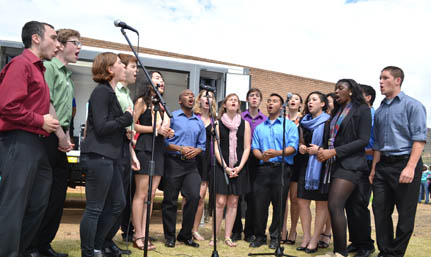Latest News Archive
Please select Category, Year, and then Month to display items
09 December 2020
|
Story UFS entral academic advising team
|
Photo Pixabay

It wasn’t easy, but we all got to this point because we stayed calm and made the effort to learn on even when it was difficult.
The University of the Free State (UFS) has remained committed to supporting you in every way possible, and as you prepare for the final assessments, remember to access the support tools you will need in order to successfully complete the 2020 academic year: https://www.ufs.ac.za/toolsforsuccess
Main exams are running from 30 November to 19 December 2020
All of the best, and break a pen in your upcoming final assessments. For those of you who will be graduating, we cannot wait to see you in that graduation attire; and those who still have some way to go, we cannot wait to serve you again in 2021 as we continue the pursuit of academic success!
Below are five main study tips that you can use for final assessment success:
1. Set a realistic study schedule
You might think that studying for eight hours straight for four days before the exam, will help you get through the work in time. See final edition of the #UFSLearnOn for more information.
2. Structure and organise your work
If your notes are organised, it is also easier for your brain to recall information, even when you become nervous during exams.
3. Practise with an old exam/semester test paper
Practice makes perfect, and although the final assessments might look different in how they are administered, it will still help to practise using old tests and exams.
4. Adapt your strategies to the content
What works for one module or even one learning outcome, might not be effective for another. You need to continually adapt your note-taking and study approaches. See #UFSLearnOn final edition for different study methods.
5. Healthy body, healthy mind
Your brain needs optimal care to perform at its best, and getting physically active (even if it is by jumping in one spot if space is limited) forces your body to release neurotransmitters responsible for positive emotions, which assist in retaining information in your memory …
Download the final edition of #UFSLearnOn that points you towards the resources you’ll need to ace your final assessments and end 2020 off on a high note!
Stanford University Talisman group blows Qwaqwa Campus away
2013-03-28
|
 |
|
'Angelic'. That is how some students described Talisman's rendition of well-known South African hymns and classics.
Photo: Thabo Kessah
28 March 2013 |
The UFS Qwaqwa Gospel Choir hosted a concert and shared the stage with the Stanford Talisman, a unique group of students from Stanford University in the USA, who sing a wide repertoire of genres, which include indigenous South African songs. According to their website, ‘Talisman was created to explore and perform substantive, cultural music’ and this is some of the music they brought to the Qwaqwa Campus.
“This unique pre-Easter concert brought all of us together through music which knows no boundaries,” said Sipho Mnyakeni, who heads Residence Life on the Qwaqwa Campus.
The Stanford Talisman choir left crowds in awe and disbelief with their rendition of indigenous Sesotho, IsiZulu and IsiXhosa hymns. Some of the songs were well-known classics composed and previously performed by the likes of Hugh Masekela and the late Miriam Makeba. One song that blew the audience away, was the well-known South African struggle song 'Asimbonanga' by Johnny Glegg, which was a tribute to the then incarcerated Nelson Mandela.
The groups were supported by Hlanganani, an IsiZulu traditional music student ensemble, and the poet, Black Butterfly.